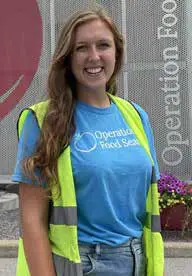Student Scholar Spotlight – Ashlyn Anderson
Student Scholar Spotlight – Ashlyn Anderson
Featured student work during their time as a college scholar in the College of Arts and Sciences.

Ashlyn Anderson
One of the areas most affected by the global pandemic has been the food system. With the rising cost of food and loss of employment, the exponential increase in food insecurity and extreme hunger will continue to affect our world for many years to come. As a senior College Scholar, my program is titled “Food Security and Public Health Nutrition” and examines food accessibility and utilization in the context of agriculture, health, and the environment. The way COVID-19 has perpetuated public health crises related to food is a topic I’ve been able to learn about in the classroom, but this summer I was able to apply my knowledge directly to the implementation of the summer meals program in St. Louis, Missouri.
After a virtual internship with the Food Research and Action Center (FRAC) last summer where I worked with food and nutrition policy in the context of pandemic-response legislation, I longed for an experience to witness these policies in action. I was awarded this opportunity in June when I was accepted as a Zero Hunger Intern along with 17 other students from across the country to participate in a 10-week internship program. This internship was facilitated by the Congressional Hunger Center, a DC-based nonprofit that allows food security advocates to gain work experience at an anti-hunger organization and develop professional skills to grow as a leader.
My internship placement was in St. Louis with an organization called Operation Food Search, where I was directly responsible for program implementation of the Summer Food Service Program (SFSP), a federally funded nutrition program that provides nutritious meals to children under 18 when school is not in session. We utilized a drive-thru distribution model to distribute to-go children’s meals and produce boxes at six sites in the St. Louis area. I served as the on-site point person for SFSP by coordinating staff and volunteer assignments, acting as a community liaison to conduct outreach with more than 50 external partners, and managing intake of meal distribution data. In the months of June and July, we served 77,879 kids’ meals, which is an exponential increase from years past given the program flexibility enacted through federal policy.
This experience was not only rewarding for my personal growth and passion for anti-hunger advocacy, but also aligned directly with my College Scholars Program. Through College Scholars, I have been given the opportunity to explore food through an intersectional lens, to examine how systems of privilege and oppression affect food access. My insights this summer were enriched because of the interdisciplinary courses I’ve taken at UT, and the dialogue I’ve had across disciplines and departments. I am grateful for College Scholars as it has challenged me to look beyond simple solutions and leverage my learning towards real-world experiences; instilling a lifelong curiosity and appreciation for education.